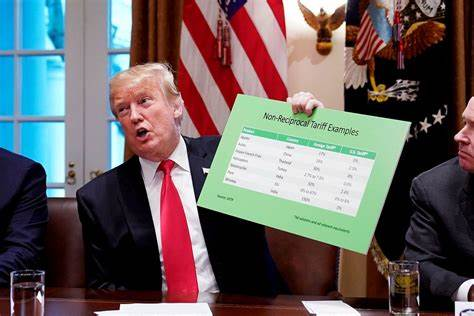It had begun on Wednesday 9th of June. US President Donald J. Trump’s imposition of thirty percent trade tariffs on South Africa took effect. South Africans should brace themselves for a period where prices become unstable. The US President known for his single-minded leadership claimed South Africa has been “ripping off” US taxpayers and insisted Pretoria impose 60% tariffs on American goods. The flamboyant Trump is not one known for sticking to facts. Just days before he implemented the tariffs, the president’s own administration released its 2025 National Trade Estimate Report on Foreign Trade Barriers. The message its findings gave were contradictory to Trump’s assertions.
The report found that “South Africa’s average Most-Favoured-Nation (MFN) applied tariff rate is just 7.6% — with 7.4% for non-agricultural products and 8.5% for agricultural products”. It further noted that tariffs of 60% or more are applied only to niche agricultural products bound under WTO rules — such as sugar or dairy — and are rarely levied on actual US exports to South Africa. Moreover, South Africa’s tariff structure is aligned with WTO norms. A total of 93.8% of its tariff lines are bound, providing predictability and transparency. The new tariff rates were calculated using what Trump calls a “reciprocal trade formula”. In essence: if a country exports more to the US than it imports from it, the surplus is treated as a form of exploitation — or, in Trump’s words, “pillaging”.
Using this formula, the Trump administration took the trade deficit, divided it by the value of US imports from each country, and used that figure to justify a reciprocal tariff. In South Africa’s case, a trade surplus — largely in cars, platinum, and citrus — became the basis for Trump’s 60% claim.
Trump is manipulating the imposition of tariffs to support manufacturing and job creation in the US. At least that is what he claims. Trump’s tariffs, bans on manufactured and agricultural goods will exempt South Africa’s raw materials market which is much cheaper. However, he is acting against the regulations and ethics of the World Trade Organization (WTO). The imposition of tariffs on South Africa by the US government is grossly unfair and are mainly imposed to exert pressure on Pretoria to capitulate to Washington’s demands. These demands are mainly that South Africa withdraw its case against Israel for carrying out genocide in Gaza. The case is ongoing in the International Court of Justice. The US as a country is significantly larger than South Africa and therefore has more industry. Trump’s unpredictable and contradictory decisions to impose tariffs across a wide range of nations are meant to cripple their economies.
Meanwhile on the American domestic front more damage is being done to the environment. Trump’s desire to impose tariffs on South Africa could do reckless harm to the American economy. The US needs to have a positive relationship with Pretoria and other African nations to have access to their raw minerals. This in turn sustains America’s own industries.
Another issue that will plague South Africa from this is the petrol prices. The country’s drivers can expect a month of wild swings when it comes to petrol price predictions for May as the Market prices shift unpredictably and take in everything from global tariff wars to local political drama.
However, economists warn that, should the Government of National Unity (GNU) fall apart, the scales will undoubtedly tip into bad news for pricing. This has been evident in significant fluctuations in the global oil price and pressure on the rand/dollar exchange rate. These are the two biggest factors contributing to local fuel price recoveries, and both are currently at odds given recent developments. Oil prices are currently accounting for an over-recovery of between 16 and 52 cents per litre. The weak exchange rate, meanwhile, is contributing to an under-recovery of around 20 cents per litre. This is mixing things up for petrol prices in particular, which are currently showing flat recoveries. Diesel drivers are on better footing with the balance positive.
The economy is on a tight rope due to the escalation of oil prices. The main issue is that the GNU’s constant bickering will lead to it falling apart. It all depends on how the country both the government, leadership, and society navigate the economy. Things are changing fast with Tump’s trade wars and the oil price hikes could be the breaking point. The risk of rising oil prices could also see a rise in other forms of prices linked to petrol such as transport costs and delivery items. South Africans are already feeling the grim reality of the increase in Value Added Tax (VAT). Oil prices are currently going to go low but they can increase again it depends on how the prices are administered.
Article written by:
Yacoob Cassim
Journalist at Radio Al Ansaar






